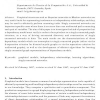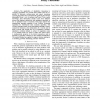799 search results - page 71 / 160 » Heterogeneous reasoning in learning to model |
ACMACE
2007
ACM
14 years 2 months ago
2007
ACM
Recently a new generation of virtual worlds has emerged in which users are provided with open-ended modelling tools with which they can create and modify world content. The result...
JETAI
1998
13 years 9 months ago
1998
Graphical structures such as Bayesian networks or Markov networks are very useful tools for representing irrelevance or independency relationships, and they may be used to e cientl...
ACL
2011
13 years 1 months ago
2011
We learn a joint model of sentence extraction and compression for multi-document summarization. Our model scores candidate summaries according to a combined linear model whose fea...
PKDD
2010
Springer
13 years 8 months ago
2010
Springer
We consider the problem of numerical stability and model density growth when training a sparse linear model from massive data. We focus on scalable algorithms that optimize certain...
FUZZIEEE
2007
IEEE
14 years 4 months ago
2007
IEEE
— The application of Qualitative Reasoning to Learning Algorithms can provide these models with the capability of automate common-sense and expert reasoning. Learning algorithms ...


